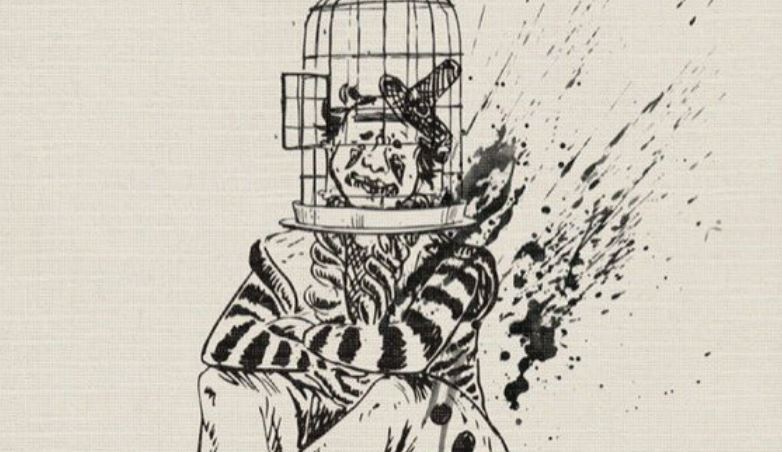Disclaimer: B. Diehl has published some of my works on his website, Philosophical Idiot.
Ballpoint Penitentiary is the second collection of poetry from poet and editor B. Diehl. While reading it, I couldn’t help but compare it to his first collection, Zeller’s Alley. Many of the themes of Zeller’s Alley appear here, such as depression, love, work, and dark humor. However, I found Ballpoint Penitentiary to be a stronger, more consistent, and more coherent collection.
The book, intentionally or not, seems to form a narrative with its poems. It’s divided into three parts and each part fits into the traditional three-act structure. In the first part, “Brandon,” the narrator of the poems, is setup as a character and we see his everyday life. In the second part, the poems become much darker as Brandon confronts certain deep impacts to his life. In the final part, Brandon copes with the changes and losses in his life and resolves to go on in spite of what he’s experienced.
Some of the poems in the first part, “I feel like checking out of the Adulthood Inn,” are more abstract than the poems in the later parts. One example is the poem “Lockpick.”
“Take the lockpick and smash up your bathroom mirror.
Take a plunger to your shit-clogged mind.
Listen to the song of your alcohol
as you puke into the toilet
with another sad poem.”
The poem is about dealing with a break-up, however, it seems to be one that the narrator Brandon is not going to dwell on.
The opening poem, “Whitman,” serves as a type of mission statement for the book. The narrator states what he wants to accomplish with his poetry with self-deprecating humor.
“I wanna break the Internet
like ‘Gingham Style’ by Psy –
like Kim Kardashian’s ass
tried to do, but failed.”
We get a good sense of what we’re in for. The narrator is unfashionable, sarcastic, and ambitious despite being aware of his limitations.
Most of the poems, however, are painfully clear narratives. In “Red Hoodie,” Brandon recounts a past relationship with a girl with an abusive mother.
“Her mother was
a cold-blooded witch.
Her father was a magician
who had perfected
the disappearing act.”
The first part ends with a poem entitled “I Quit My Job Today.” This is another more abstract poem about the tedium of work.
“Sever your preconceived notions.
Stop pretending your mind isn’t a picklock
for the the gate to a better life.
Quit your day job with your middle fingers up.”
The first major change in Brandon’s life has happened. It appropriately ends the first part and brings us to the second.
While the second part, “No one should ever apologize for caring,” also continues the themes of Brandon’s daily life, it mainly revolves around two particularly traumatic events. That is, Brandon accidentally impregnates his girlfriend and they decide to abort, and the death of Brandon’s grandmother.
Even in these events, Brandon maintains his humor. But here, it’s far more bitter and more obviously a coping mechanism. In “Abortion Clinic” Brandon and his girlfriend deal with obnoxious pro-life protesters as they head to the clinic. This does little to dissuade them.
“’Any second thoughts?’ Ellen asked again.
‘Nope,’ I said, ‘we’re doing the right thing.’We walked into the clinic,
heroically.”
The death of his grandmother affects Brandon even more. He has to see her dying in a home that neglects her and her funeral gives him no closure.
“And I will remember what you said about Heaven, too:
‘It has got to be more than just high-in-the-sky nonsense.’I really want to believe that.”
In the last few poems, we see Brandon fixating on death, of his past acquaintances and pets, and tension between him and his girlfriend. The last poem in this section is “The Saddest Day of 2015” in which Brandon goes shopping on Black Friday and finds himself disgusted with everyone around him.
“I’m thinking about ISIS again. But maybe there’s nothing
to worry about on that subject. Terrorists won’t waste
their time here right now. Why should they bother? In America,we’re already destroying each other.”
The final part, “Trust is always phase one of a war,” we return to seeing Brandon’s daily life and ponderings. However, he’s far more beaten down and disillusioned here. The poem “Humans” is a hard-hitting piece of pure misanthropy.
“The one thing to remember is that
naivety is a cancer. It will ransack
and pollute your vital organs.
Trust is always phase one of a war.”
As heavy and depressing as I make this part sound, there are still several humorous poems which fit the theme. One example is “Fat Redneck” wherein Brandon gets in an internet argument with his girlfriend’s ex.
“@_COWBOY_PIMP_PLAYA go make your own sandwich.
and give me your twitter handle. i want it. i’m jealous
that it’s yours. it’s amazing.Here is his timely reaction:
@iambrandondiel UR THAT MOTHERFUCKR WHOS BIN
HANGIN WIT MY MAIN BITCH. FUCK OF OR IMGONNA
CRACK UR FUCKINGG SKULL FAGGOT!”
It’s implied, though never explicitly stated, that Brandon and his girlfriend break up at some point in this final part. Despite this, the final few poems become increasingly hopeful, ending on the poem “I Probably Deserve an Oscar.’
“You honestly made me feel as though
my heart was snorting lines of cocaine
(and somehow, that was a good thing).”
Some of the coverage you find on Cultured Vultures contains affiliate links, which provide us with small commissions based on purchases made from visiting our site.

